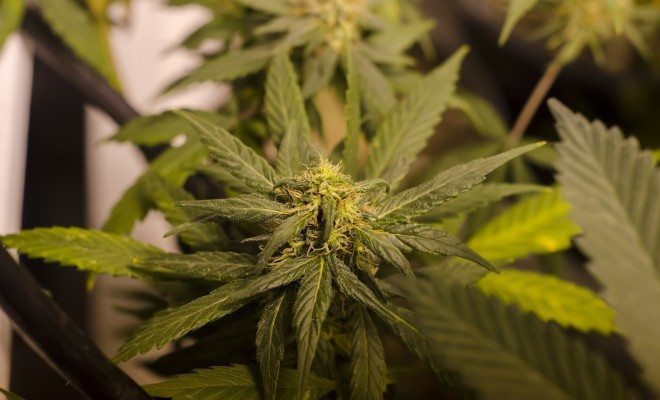 Image courtesy of [Brett Levin via Flickr]
Image courtesy of [Brett Levin via Flickr]
Cannabis in America
Legal Marijuana Laws: Colorado v. Washington
Washington and Colorado approved voter referendums in November 2012 to become the first states in the nation to allow recreational marijuana sales; however, the states have taken different regulatory paths. Colorado started selling recreational marijuana on January 1, 2014, while Washington’s first legal stores opened on July 8, 2014. Regulators in Washington have frequently been in contact with those in Colorado to smooth the implementation process. The infographic below shows a quick breakdown of the two states’ policies, and if you’d like to learn more about what’s going on with these rules read on to the in-depth analysis below.
Who is allowed to buy marijuana?
Colorado and Washington both regulate marijuana similarly to alcohol. Only those aged 21 and older can buy recreational weed. Walk into a store, show your ID, and you can make a purchase. Customers are limited to buying or possessing only one ounce of marijuana at a time. Rarely would anyone buy a full ounce — more commonly marijuana is sold as an eighth of an ounce. Should you need more than an ounce, however, you would not be prohibited from making multiple trips to the store in the same day.
In Colorado, buyers from out of state are limited to buying only one-quarter of an ounce at one time, while there is no restriction on purchases by out-of-state visitors in Washington. Marijuana bought in the state must then be consumed in the state. In Colorado, you can share marijuana with others as long as you don’t receive any cash. In Washington, any purchase of marijuana must be for personal consumption. In both states marijuana transactions often have to be made in cash, since credit cards cannot be used due to federal banking regulations; however, state banks in Colorado moved to set up more local credit unions and issue debit cards that can be used for marijuana purchases.
How much does marijuana cost?
In Colorado, shops opened January 1, 2014 and were met with high demand. Initially 136 shops acquired licenses from Colorado’s Marijuana Enforcement Division, but the state has set no official cap on the number of licenses it will issue. The city of Denver, however, has a two-year moratorium on new marijuana businesses. Many other cities, such as Colorado Springs, banned recreational marijuana shops altogether. In the first days of sale, prices for high-quality marijuana rose to more than $300 per ounce. NPR reports that over the weekend of July 4, 2014, prices at a large chain hovered around $85 an ounce. Other estimates show the price per gram in Colorado typically averages $16 to $20.
In Washington, initial sales are likely to lead to product shortages and higher prices. Marijuana can only be purchased in retail shops licensed by the state; however, only 24 shops were licensed for the first day of sales, so owners may initially be inclined to ration. The state set a cap of 334 licenses to be distributed in accordance with population. The Washington State Liquor Control Board still has thousands of applications to sift through. Like Colorado, many municipalities in Washington banned recreational sales of marijuana. In Seattle, with a population of 652,000 and likely the hottest market, only one shop will be open on the first day of sales. Vancouver has two shops and Spokane has three. Growers of marijuana only received their licenses in March, meaning that there has not been enough time to grow a substantial amount of marijuana. Store owners indicate they want to sell for roughly $12 per gram, but the cost per gram could rise to as much as $25. Medical marijuana dispensaries in the state average between $10 and $15 per gram. Watch for more information on the marijuana shortage below:
How much is the state making off sales?
In both states, recreational marijuana is heavily taxed. Colorado buyers face a 15 percent excise tax, 10 percent special sales tax, and a 2.9 percent standard sales tax. Various localities then add additional taxes. Colorado’s amendment dictates that the first $40 million in taxes raised annually by marijuana sales must go toward the state’s public schools. According to USA Today, Colorado collected more than $24 million in marijuana fees and taxes through April 2014. In the fiscal year beginning July 2014, the state expects to make $98 million from marijuana. Tourism also increased, likely in part due to the marijuana law — 2013-2014 was the state’s best ski season to date. Watch an overview of Colorado’s marijuana industry below:
In Washington, an excise tax of 25 percent is levied at three different points in the sale process: from grower to processor, processor to retailer, and retailer to customer. According to USA Today, Washington is expected to collect $190 million from fees and taxes over the next four years.
What restrictions do marijuana shops face?
The two states regulate shops a little differently. Both only allow sales between 8:00am and midnight, and any marijuana sold in the state must be grown in the state. Initially in Colorado, any business wanting to sell recreational marijuana already had to be an existing medical marijuana dispensary. Vendors must be residents of Colorado and undergo a background check. They must apply through the Colorado Department of Revenue’s Marijuana Enforcement Division and typically have to apply for a local license as well. Beginning October 1, 2014, new recreational facilities will be able to apply for licenses. Medical marijuana dispensaries pay a $500 application fee to get a recreational license, while new businesses face a $5,000 application fee. Annual licensing fees can range from $3,750 to $14,000. Colorado also allows companies to vertically integrate by growing, processing, and selling as a single company. Additionally, individuals are allowed to grow up to six plants for personal use.
In contrast, Washington gave medical marijuana dispensaries no edge in the application process over new businesses. The medical marijuana industry was unregulated, so the state created regulations from scratch, including protocol-testing, child-resistant packaging, and shop security systems. Vendors must be residents of the state and are subject to a background check. The law separates producers, growers, and retailers. Businesses face a $250 application fee for a license and a $1,000 annual renewal fee. The state also limits overall marijuana growing to 200 million square feet. Washington does not allow individuals to grow plants themselves.
Are edibles available?
One of the most high-profile issues Colorado faces is how to regulate marijuana edibles, which are often seen as a hassle-free way to consume marijuana. Yet several severe cases illustrated potential dangers of edibles. On March 11, 2014, a college student from Wyoming jumped from a balcony to his death after eating a potent marijuana cookie. In another case, Richard Kirk suffered severe hallucinations after allegedly taking painkillers and eating marijuana-infused candy. The hallucinations led him to shoot and kill his wife. New York Times columnist Maureen Dowd recently chronicled her experience with marijuana edibles to further heighten awareness of the issue. Colorado is aiming to make buyers aware of portion size and THC content, but is still experiencing difficulty regulating edibles and keeping them from the hands of unsuspecting children. The video below explores Colorado’s problems with edibles:
So far Washington has not approved any edible products. Edibles must first be tested and approved, so there will be a bit of a wait before they hit the Washington market.
Are there other regulations?
Smoking Areas
Both states ban smoking in public places, including in marijuana shops. The bans are enforced similar to open-container laws. In Washington, consuming in public means a fairly light $27 fine. Things can get trickier for tourists trying to find a place to consume. Only 25 percent of hotel rooms in Washington are designated as smoking, and it is unclear if hotels will permit smoking marijuana.
Driving
Driving under the influence of marijuana is illegal in both states. Anyone driving with more than five nanograms of THC per milliliter can be issued a DUI. Tests for THC are not as easy as a breathalyzer, especially since THC can linger in the body long after an initial high. If a driver was suspected of being high, an officer would likely have to drive the individual to the hospital for a blood test to get conclusive results. In Colorado, marijuana was involved in 12.5 percent of DUIs occurring in the first five months of 2014, a statistic that the state has only just begun tracking. Watch a video about DUIs below:
Other Issues
Despite the legality of recreational marijuana in these states, questions linger. Employers can still fire employees for showing up high or for testing positive, even though marijuana is legal. An in-depth look at the issue can be found here. States are also wary of consumers who may go to a number of stores to buy a small amount of marijuana at each and then sell it on the black market. The Justice Department is continuing to work on legal guidance for banks on how to deal with local retail marijuana sales. Despite these issues, the sale of marijuana has been a large success in Colorado, with voters now favoring the law by a 22-point margin after witnessing relatively smooth implementation. Should kinks in these laws be worked out, more states will look to Colorado and Washington when implementing marijuana laws of their own. Colorado has increased its regulation of marijuana since the law was first implemented and has not experienced serious consequences. More regulation of edibles in the future will likely lead other states to follow marijuana policies similar to those of Colorado and Washington.
Resources
Primary
Washington Liquor Control Board: Fact Sheet
Additional
Time: Everything You Need to Know About Buying Legal Weed
Time: Colorado Kids are Accidentally Ingesting Pot
NPR: Washington State to Start Recreational Pot Sales
The New York Times: Still-Divided Washington Prepares for Start of Recreational Marijuana
Mercury News: Marijuana Legalization in Colorado
USA Today: With Legal Marijuana, Washington Joins Exclusive Club
CNN: 10 Things to Know About Nation’s First Recreational Shops
Denver Post: Colorado Voters Approve New Taxes on Recreational Marijuana
USA Today: Colorado, Washington Differ in Legalizing Marijuana
Brookings: Legal Marijuana: Comparing Washington and Colorado
The New York Times: Don’t Harsh Our Mellow, Dude
New York Magazine: Washington Starts Selling Legal Weed: What You Need to Know
The New York Times: Sales of Recreational Marijuana Begin in Washington State
Denver Post: A Colorado Marijuana Guide: 64 Answers to Commonly Asked Questions
Denver Post: Colorado Recreational Marijuana Industry Begins
—
Alexandra Stembaugh is a senior at the University of Notre Dame studying Economics and English. She plans to go on to law school in the future. Her interests include economic policy, criminal justice, and political dramas. Contact Alexandra at staff@LawStreetMedia.com.








Comments